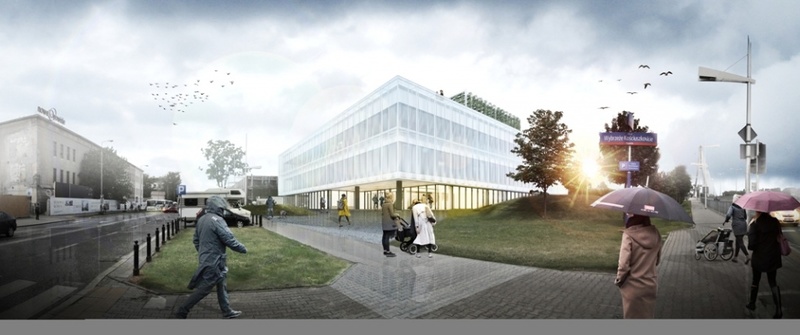Thessaloniki gets ready for its metro launch in November
The underground rapid transit lines have been under construction for almost two decades due to various project delays
 TheMayor.EU logo
TheMayor.EU logo It will support the development of key competences for the 21st century
Warsaw Municipality announced on Tuesday that expansion of the famous Copernicus Science Centre has started. A new interdisciplinary research and development centre will study learning processes and create modern educational tools. The construction of the building is expected to be completed in 2022.
The Pracownia Przewrotu Kopernikańskiego or PPK (translated as Copernican Revolution Workshop) will be an interdisciplinary research laboratory for creative debates and networking. It will become the newest element in the complex, which already consists of the main building of the Planetarium, Pavilion 512 and the Copernicus Science Centre.
The building will be located in the immediate vicinity of the Vistula riverside boulevards and will be connected to the Centre through an underground corridor. It should be able to accommodate 600 people at a time and will count with a total area of approximately 6000 square metres.
 The simple cuboid-shaped body with an original facade will create a visually attractive, energy-saving and environmentally friendly building illuminated by natural light. There will be photovoltaic panels on the roof, as well as installations enabling the use of rainwater in sanitary facilities.
The simple cuboid-shaped body with an original facade will create a visually attractive, energy-saving and environmentally friendly building illuminated by natural light. There will be photovoltaic panels on the roof, as well as installations enabling the use of rainwater in sanitary facilities.
The architectural concept of the new building was developed by the Wrocław-based studio Heinle, Wischer und Partner Architekci, headed by Edzard Schultz and Anna Stryszewska-Słońska. The contractor for the construction project is Unibep.
PPK will be a place of interdisciplinary research and development in the fields of education, psychology and sociology, new technologies and engineering sciences. The aim is to create prototypes and innovative educational solutions supporting the development of key competencies in the 21st century on the basis of the acquired knowledge.
The new headquarters will allow for comprehensive implementation of projects: from research under strictly controlled conditions through prototyping and testing of ready solutions in conditions that mimic real life. The plan is for the facility to be used by technology, educational and coaching companies.
To that end, PPK will be an open, interdisciplinary space. It will include laboratories equipped with the tools necessary to conduct biological, chemical, physical and mechatronic classes, as well as a professional recording studio.
There will also be a large construction workshop with tools for designing and implementing engineering challenges. The space will be adapted to testing the class formats in school conditions and similar to those in which scientists work. Behavioural analysis equipment and recording devices will allow for advanced research.
The total cost of construction and investment works is approximately PLN 82 174 000 (18.7 million euros). The investment is co-financed by the European Union’s Regional Development Fund with PLN 16 765 860.42 and subsidies from the city budget to the amount of PLN 27 690 101. The remaining money is contributions from the Copernicus Science Centre's consortium members and sponsors.
The construction start announcement comes in the context of the 10th anniversary of the Copernicus Centre which has gradually become a key point on the cultural and educational maps of the Polish capital. For tourists alike, it is a must-see attraction - every year, it is visited by over a million people and almost half of them are students and teachers.
As the Mayor of Warsaw Rafał Trzaskowski summarized it - the Centre is responsible for many innovative projects and has done much to popularize science and now it gets to expand even further.

The underground rapid transit lines have been under construction for almost two decades due to various project delays

Now you can get your wine in Talence by paying directly in Bitcoin

That’s because the state has to spend money on updating the railway infrastructure rather than subsidizing the cost of the popular pass

Rethinking renewable energy sources for the urban landscape

The examples, compiled by Beyond Fossil Fuels, can inform and inspire communities and entrepreneurs that still feel trepidation at the prospect of energy transition

Now you can get your wine in Talence by paying directly in Bitcoin

The 10th European Conference on Sustainable Cities and Towns (ESCT) sets the stage for stronger cooperation between the EU, national and local level to fast track Europe's transition to climate neutrality.

At least, that’s the promise made by the mayor of Paris, Anne Hidalgo

The underground rapid transit lines have been under construction for almost two decades due to various project delays

At least, that’s the promise made by the mayor of Paris, Anne Hidalgo

Hostal de Pinós is located in the geographical centre of the autonomous region

Despite its church-y name, the district has long been known as the hangout spot for the artsy crowds

Urban dwellers across the EU are having a say in making their surroundings friendlier to people and the environment.

Forests in the EU can help green the European construction industry and bolster a continent-wide push for architectural improvements.

Apply by 10 November and do your part for the transformation of European public spaces

An interview with the Mayor of a Polish city that seeks to reinvent itself

An interview with the newly elected ICLEI President and Mayor of Malmö

A conversation with the Mayor of Lisbon about the spirit and dimensions of innovation present in the Portuguese capital














